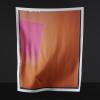Loading cart
Richard Caldicott · Chance/Fall (11)
Color photography (2010)
Reproduced on 100% Silk · Limited Edition of 50 · Size: 131 X 107 cm
FILED UNDER questions the demands raised on images. The first project Silk Prints examines the supposed contradiction between image and object, the ambivalence of the distinct images and its manifestation as produced object. This dichotomy in the realization of the images, as being able to be touched and experienced, is stressed by the usage of silk prints.
Exhibition at Art Weekend, Munich
Galerie f 5,6 · October 21–23, 2011 · Ludwigstraße 7 · Munich
For the Art Weekend the Galerie f 5,6 will host an exclusive presentation of the project FILED UNDER. Join us for the opening October 21, 6–10 pm.
Works by various artists, including Florian Süssmayr, Martin Fengel, Luca Pizzaroni, and Richard Caldicott, will be used to explore the boundaries between image and object.
The wonderful Daphne Guinness with FILED UNDER / edition "You Gonna Like the Way You Look" by Luca Pizzaroni.
... moreDrapery
Detail of Cupid and Psyche, François Gérard, Oil on canvas (1798/2011)
Printed on 100% Silk · Limited Edition of 50 · Size: 107 x 141 cm
... Civilized human beings wear clothes, therefore there can be no portraiture, no mythological or historical storytelling without representations of folded textiles. But though it may account for the origins, mere tailoring can never explain the luxuriant development of drapery as a major theme of all the plastic arts.
Artists, it is obvious, have always loved drapery for its own sake - or, rather, for their own. When you paint or carve drapery, you are painting or carving forms which, for all practical purposes, are non-representational-the kind of unconditioned forms on which artists even in the most naturalistic tradition like to let themselves go.
Florian Böhm · Sara Jewelry
Color photography (2005)
Reproduced on 100% Silk · Limited Edition of 50 · Size: 134 X 107 cm
Italian curator Emanuela Nobile Mino on Florian Böhm's edition:
I’ll Be Your Mirror.
What distinguishes the object from the subject is basically the question of the role that, by definition, each is respectively called on to assume and of the relationship that they are destined to forge with each other by nature. The former (the object) is born with a precise but passive function—that of being used by the second (the active subject). The intrinsic functionality of every object varies according to the requirements of the subject, which, depending on personal, social, environmental and cultural needs, will determine which typology of object will turn out to be compatible with the gratification of its own or other people’s everyday desires and/or needs. Consumerism, whose aim is (and was) to expand significantly the spectrum of the subject’s needs in nourishing its instinct to crave, has ended up by overturning the terms of the atavistic relationship between subject and object.




